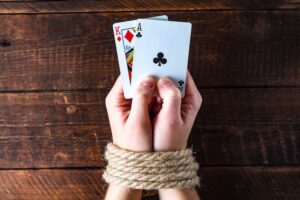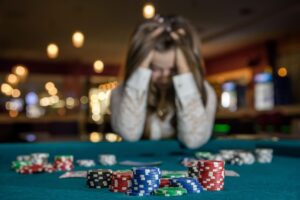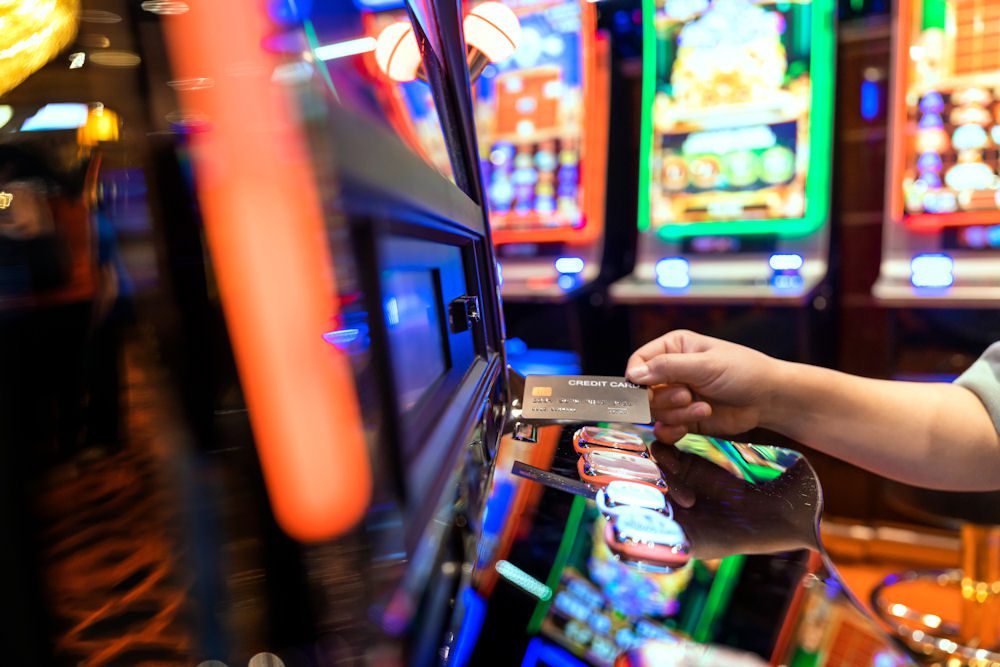Yes! Individuals who suffer from compulsive gambling problems, like those who are addicted to drugs, can experience withdrawal symptoms—some of which can be quite severe.
If you are one of those who gamble and feel like you can’t stop it, know that you are not alone! Many don’t realize how much they are into gambling until they start to experience the negative psychological and physical symptoms of gambling withdrawal. Gambling addiction is a real issue that one should not ignore. It can lead to potentially serious and damaging effects to both the gambler and those around them.
Learn more about its effect on the brain, the different gambling withdrawal symptoms, and potential treatment at the Northern Illinois Recovery Center!
What Is Gambling Addiction?
Gambling addiction is a mental health disorder that can leave you feeling helpless and out of control. It’s characterized by an urge and obsession to gamble despite the consequences, even when you aren’t actively participating in it.
Gambling addictions can possibly develop in anyone from all walks of life. It can happen to young or adults, poor or rich, celebrities or not, students or professionals. Gambling doesn’t just go about betting on sports, scratch cards, roulette, poker, or slots; gambling also happens when you purchase a lottery ticket, participate in a raffle, or do something as simple as betting with your friends. These gambling activities can harm relationships and affect your work. There are even those who take on massive debts or steal money just so they can gamble—things you never thought you would.
Gambling Addiction Symptoms
 The symptoms of gambling addiction are commonly the same as those of other addictions. These include the following:
The symptoms of gambling addiction are commonly the same as those of other addictions. These include the following:
- Feeling the need to keep your gambling activities a secret
- Having difficulties controlling your gambling habits
- playing when you can’t afford it
- Your relatives and friends worry about your gambling activities
Of course, the most obvious sign of gambling addiction is when you feel like you can’t stop it. Just like with any other addiction, you constantly feel like you need to give it another try, or you feel uncomfortable when you consider quitting. If you believe you or your loved ones are experiencing these gambling problems, immediately call for help to discuss your situation.
But what goes on in the brain to cause all this?
The Neurological Effects of Gambling Addiction
Gambling withdrawals are real, and they can be just as severe as those from substance addiction. Part of the reason is that gambling addiction activates the brain’s reward system, similar to drug addiction.
This happens by triggering the release of dopamine, a neurotransmitter that triggers feelings of pleasure. The more dopamine released, the more pleasure is experienced, and this greatly reinforces the habit or behavior. It’s why people with a compulsive gambling disorder continue to make unhealthy decisions in their pursuit of that reward, even when it causes negative consequences for them or those around them.
However, like most rewards, this pleasure can fade away during long periods without it, leading to withdrawal symptoms for many people with a gambling addiction. These symptoms can range from depression and anxiety to insomnia and cravings for gambling. In some cases, physical signs of withdrawal, such as nausea or headaches, may be experienced too.
What Are the Symptoms of Gambling Withdrawal?
A compulsive gambler can go through different withdrawal symptoms that may range in severity. Gambling withdrawal symptoms may be categorized into two types: emotional and physical.
Emotional Gambling Withdrawal Symptoms
Depression
 When struggling with a gambling addiction, a person may experience a range of negative emotions, including depression. Depression affects your feelings, thoughts, and behavior, and it is a common and serious medical illness. It results in a loss of interest in previously enjoyed activities.
When struggling with a gambling addiction, a person may experience a range of negative emotions, including depression. Depression affects your feelings, thoughts, and behavior, and it is a common and serious medical illness. It results in a loss of interest in previously enjoyed activities.
Depression can affect a person’s ability to function at work and at home and cause a number of emotional and physical issues. Depressive symptoms include:
- Having no hope and feeling helpless. Contrarily, some people gamble in an effort to feel in control, only to quickly lose that sense.
- Lack of interest in daily activities;
- Changes in sleeping habits. Sleep is crucial for mental health, and sleep interruptions may be a sign of more serious issues.
Anxiety is a normal and common response to a stressful situation or danger. It is a feeling of unease, such as worry or fear, that can be mild or severe. When someone is struggling with a gambling addiction, they may experience intense feelings of anxiety and worry about their financial situation, relationships, and other areas of their life that are affected by their gambling behavior.
The anxiety associated with gambling addiction can manifest in various ways, such as sweating, shaking, heart palpitations, racing thoughts, restlessness, and difficulty concentrating.
A sleep disorder known as insomnia is characterized by difficulties falling and/or staying asleep. Chronic insomnia can lead to irritability, difficulty concentrating, fatigue, and other health problems.
It is important to seek help if you or someone you know is experiencing symptoms of gambling addiction or insomnia. There are various treatment options available, including therapy, support groups, and medication, which can help individuals overcome their addiction and manage their sleep problems. Additionally, practicing good sleep hygiene, such as avoiding caffeine and electronic devices before bed, can also help improve sleep.
Cravings or the strong desire to gamble again happen because the brain understands that gambling is the simplest and quickest way to satisfy your body and mind with the “thrill” experience it craves. Addiction-related cravings are stronger than regular food desires, for example.
Cravings come and go, and they might vary greatly in type and intensity. Usually, a trigger for a craving results in obsessive thoughts right away.
Physical Symptoms of Excessive Gambling
Physical symptoms of gambling withdrawal may also be experienced and can be accompanied by emotional withdrawal. For example, anxiety or depression can cause a lack of sleep. Lack of sleep can then result in weight gain or loss, pale skin, acne, or dark bags under the eyes. Other physical withdrawal symptoms include but are not limited to
- Sweating
- Headaches
- Racing heart
- Palpitations
- Muscle tension and/or soreness
- Tightness in the chest
- Difficulty breathing
- Tremors
- Nausea
It is important for anyone experiencing any withdrawal symptoms related to a gambling problem to seek professional help as soon as possible. Withdrawal symptoms can be very uncomfortable and difficult to cope with, but once an individual begins receiving proper support and treatment, they will start feeling better. Withdrawal should be taken seriously as it may even result in suicidal despair if left unchecked.
Treating Gambling Withdrawal Symptoms
When dealing with gambling addiction, it’s really important to remember that withdrawal symptoms can be just as intense and severe as those associated with drug addiction—the brain actually reacts in the same way.
As with other addictions, the only way to get substance-free relief from these withdrawal symptoms is through treatment and therapy. Typically, it involves a combination of therapy, support groups, medication, and counseling.

Counseling for problem gambling can help you identify triggers for your behavior before things get out of control. It will also help you deal with your negative emotions in a healthy way.
In extreme cases, medication may be required if depression or anxiety becomes too debilitating. This can include the prescription of antidepressants or anti-anxiety drugs. These medications are known to help treat the symptoms that frequently coexist with gambling addiction.
When addiction is severe, inpatient treatment may be required to help people recover. Inpatient treatment is a type of intensive program where one must move to a residential treatment center and receive support services and medical attention around the clock. Aftercare planning, referrals to support groups, outpatient therapy, and other services may also be part of the program.
In addition to this, cognitive behavioral therapy (CBT) may also be beneficial. It allows you to safely explore the underlying causes of your behavior. At the same time, it helps you develop strategies to cope with compulsions and cravings and avoid relapsing. This therapy enables you to recognize and alter harmful gambling-related thought patterns and behaviors. Cognitive-behavioral therapy (CBT) is commonly used to treat gambling addiction.
Joining support groups like Gamblers Anonymous is a great way to treat gambling addictions. It offers a secure and supportive environment for people to share their experiences and get encouragement from others who are also in recovery from gambling addiction.
In addition to these therapies, it’s critical for people to adjust their lifestyles and develop healthy habits. Avoiding situations that could trigger gambling and engaging in self-care practices that can advance general health and well-being are great ways to do this.
Get the Right Gambling Treatment at Northern Illinois Recovery
Gambling addiction is a serious issue that can have long-lasting consequences. If you or someone you know is going through gambling withdrawal or addiction symptoms, take immediate action. Contact our team and speak to one of our gambling addiction specialists, who can help you or a loved one overcome this problem.




